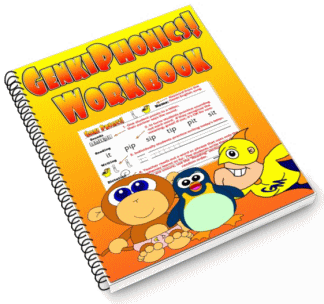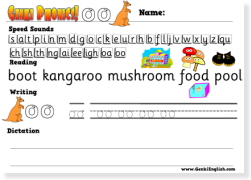UPDATE: This course is now completed and you can find the finished version over on the Phonics page!


Today we have more pages for the hugely popular Phonics Workbook. This time going right up to cover th, ng, ai, ee, igh, oa, oo, ar or, ur, ow, oi, ear, air and er.
Depending on where you were brought up (i.e. your own English accent) that should just about cover all the major sound groups. A much requested feature was a front cover page, so I’ve included that as well.
What do you think? Can you tell which sounds aren’t covered yet?
P.S. I couldn’t think of any Genki English word for “ure” – any ideas?
P.P.S. Now the book is finished it is now a paid for download on the phonics page!



Richard,
THANK YOU! This is what I needed today.
This book really works so well! I just was so surprised last week, watching my daughter working with it. We are at the “k” letter now, and I give them a dictation each week with the letters we did so far “A pink pig on a cat” or sth. like that. They (2nd grade) can write it with no hesitation ; at home they draw the “silly sentence” on their book cover.
What surprised me is that my daughter doesn’t respond at all to letter names anymore. Of course at some point she knew the Alphabet song (from TV or where ever) but now, those names don’t mean anything to her. If I tell her the sound she can write it immediately.
Same with capital letters. They had a hard time to get used to small case letters and couldn’t remember them, now they naturally just write them down.
One QUESTION:
Looking through the book I couldnt find any “magical-e-words”
(kite, late, cane, …)
What do you suggest to do with these?
These are actually the hardest for Japanese kids. Teaching them is fine and pretty logical , but then they learn Romaji in school and it’s so hard to get them away from that.
With the other sounds the letters are following each other so it’s pretty easy for them to remember
“igh” as one sound (f.ex.)
but with “..a..e” there is a letter in between, and once they have done Romaji it seems so hard for them to recognize it as ONE sound here.
Please let me know, if you have anything for this coming up as well, or how you suggest to teach it.
Thanks so much. I’m feeling much better today.
Margit
Glad it’s working so well!
In the UK magic e is usually taught after the basic sounds, hopefully I’ll get to that soon!
Brilliant!!!!!! Thank You Richard.
Thanks! I’ve been using these with good results with two of my kids. We’ve been going really slow with it, but it’s sinking in.
some words with ure:
cure, future, sure, adventure, culture, conjurer, measure, creature, failure (is not an option in this dojo, is it?), figure, furniture, lecture, leisure, literature, manure, manicure, pedicure, picture, treasure, vulture
excellent book, as usual.
how about all the different sounds for ‘ou’. i think i read somewhere that there were 8, lets think you, ought, ouch,
The one sound the phonics still seems to be missing is AW, even with the Alternative Spelling…and for me UR, ER, URE are all the same (not that I mind teaching different spellings for all the sounds, the more awareness the better).
Hi Martin,
Aw’s there, page 91 on the posters!
http://genkienglish.net/clipart/genkiphonicsposters.pdf
Yeah, with the others there will always be some vowels that are the same for our own particular accent, there are so many teachers out there who pronounce “Mary”, “Merry” and “Marry” just the same! 🙂
Ah, yes. Maybe I was more wondering why it wasn’t included prior to the “Alternative Spellings” section, perhaps instead of “er” or “ure”. I felt Book 7 was a little redundant with “ur” “er” and “ure” while completely missing the “aw” sound. Must be that British vs. American accent thing.
The primary spelling is “or” hence we have that page first and the “aw” in the alternatives. I think it’s pretty close call on that one though.
The “ur” “er” and “ure” are pretty distinct in most accents, even in the states, think of “Teenage Mutant Ninja TURtles” or the movie voice over guys saying “The AdventURE of a life time” 🙂
Yeah, definitely an accent thing. In the midwest accent, “er”, “ir”, “ur”, “ure” are basically the same. “or” and “aw” are quite different since we place emphasize the /r/ sound.